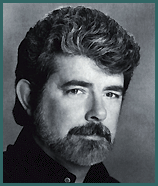Having been a cinematographer yourself, you know that directors of photography pride themselves on getting the images in-camera on the day of the shoot. Certainly that will change with the advent of digital cinematography.
Lucas: I think cinematographers would love to have ultimate control over the lighting; they'd like to be able to say, 'Okay, I want the sun to stop right there on the horizon and stay there for about six hours, and I want all of these clouds to go away.' Everybody wants that kind of control over the image and the storytelling process. Digital technology is just the ultimate version of that. All I've been doing is pursuing what, I think, is the desire of a lot of the creative artists and craftsmen in the business: to be able to manipulate and control what's going on in front of them without this kind of randomness that they have to put up with.
So now you plan to go out, film the shots the best way you can...
Lucas: And fix them. I like to let the real world invade my creation. When you're trying to do it exactly like the storyboards, you're always fighting Mother Nature to get what you want, it costs a huge amount of money, and it's very difficult. This way, you can make shots conform to your idea after the fact, rather than trying to conform the world to what your idea is. It allows this serendipity to enter the picture, and gives you this whole other thing you can feed off that you don't have when you're trying to make films in a more pristine state.
You can make each shot look exactly like the storyboards—or, if something else happens that's even better, you can change your idea and do that. That just wasn't possible before. The advantages of digital technology and digital imaging are awesome, and I think that what you really need to concentrate on, in the end, is what appears on the screen before the audience. It's not just an image, it's a succession of images. How do the graphics and the lighting and all those things help to tell a story? That's what the cinematographer is very involved in, and it's extremely important.
Change is inevitable, and to try to stop change is a very painful experience that you can't win. Film is—a very unique thing, but it is going to go out of use. And you have to accept the fact that this change is going to happen.
Rick McCallum says you would like to shoot the next Star Wars film digitally.
Lucas: Well, that's what we're exploring right now. If it wasn't going to be a widescreen picture, it definitely would be digital. But we're not there yet [in terms of shooting digital for widescreen]. I think we'll be there in the next 18 months, but that'll be too late for this one.
Do you fell that this new technology will ultimately enable you to approach making a movie the way you would write a script, where you can rewrite it or remake it as you go?
Lucas: No. The road of life leads you into many strange places, and it doesn't always go where you want to go or think you're going to go. I mean, I've enjoyed the trip. I never in a million years would have though that I would be where I am today, knowing what I am today. I'm enjoying it, obviously, or I wouldn't be doing those [experimental] movies. That's my lifelong ambition. My feelings about them have changed a little bit. MTV videos have sort of moved into that area of non-linear, non-story, non-character filmmaking. Some of it is pretty crude, but I'm very interested in how it evolves. I probably won't get to it for another five or six years, anyway. But it's funny: for somebody who started out as a very non-linear, noncharacter, non-story filmmaker, I've become this epitome of storytelling. You know, for somebody who hated writing scripts, I've basically become a script-writer, because that's mostly what I do now.
It's happened organically. I've gotten to the place I am because I love making movies. My fascination with the medium and my interest in the medium has driven everything. I love to work with it and explore the possibilities, and then tell stories in different ways. In order to control the creative vision, to advance the art and make it easier for me to make movies, I've ended up doing all of these other things.
You know, the one thing my father always wanted me to do was to go into business. He ran a stationary store, and when he retired, he wanted me to take over. And I said, 'Dad, there's one thing I know I'll never do. I'll never be the head of a large company!'
So the moral is, never say never!
